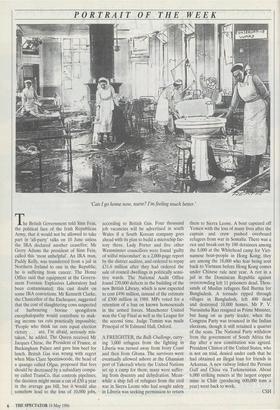PORTRAIT OF THE WEEK
ran Igo home now, nurse? I'm feeling much better.'
The British Government told Sinn Fein, the political face of the Irish Republican Army, that it would not be allowed to take part in 'all-party' talks on 10 June unless the IRA declared another ceasefire; Mr Gerry Adams the president of Sinn Fein, called this 'most unhelpful'. An IRA man, Paddy Kelly, was transferred from a jail in Northern Ireland to one in the Republic; he is suffering from cancer. The Home Office said that equipment at the Govern- ment Forensic Explosives Laboratory had been contaminated; this cast doubt on some IRA convictions. Mr Kenneth Clarke, the Chancellor of the Exchequer, suggested that the cost of slaughtering cows suspected of harbouring bovine spongiform encephalopathy would contribute to mak- ing income tax cuts practically impossible; `People who think tax cuts equal election victory . . . are, I'm afraid, seriously mis- taken,' he added. The Queen received Mr Jacques Chirac, the President of France, at Buckingham Palace and gave him beef for lunch. British Gas was wrung with regret when Miss Clare Spottiswoode, the head of a quango called Ofgas, proposed that fees should be decreased by a subsidiary compa- ny called TransCo, that controls pipelines; the decision might mean a cut of £50 a year in the average gas bill, but it .would also somehow lead to the loss of 10,000 jobs, according to British Gas. Four thousand job vacancies will be advertised in south Wales if a South Korean company goes ahead with its plan to build a microchip fac- tory there. Lady Porter and five other Westminster councillors were found 'guilty of wilful misconduct' in a 2,000-page report by the district auditor, and ordered to repay £31.6 million after they had ordered the sale of council dwellings in politically sensi- tive wards. The National Audit Office found 230,000 defects in the building of the new British Library, which is now expected to cost £496 million, instead of the estimate of £300 million in 1988. MPs voted for a retention of a ban on known homosexuals in the armed forces. Manchester United won the Cup Final as well as the League for the second time. Judge Tumim was made Principal of St Edmund Hall, Oxford.
A FREIGHTER, the Bulk Challenge, carry- ing 3,000 refugees from the fighting in Liberia was turned away from Ivory Coast and then from Ghana. The survivors were eventually allowed ashore at the Ghanaian port of Takoradi where the United Nations set up a camp for them; many were suffer- ing from dysentry and dehydration. Mean- while a ship full of refugees from the civil war in Sierra Leone who had sought safety in Liberia was seeking permission to return them to Sierra Leone. A boat capsized off Yemen with the loss of many lives after the captain and crew pushed overboard refugees from war in Somalia. There was a riot and break-out by 100 detainees among the 8,000 at the Whitehead camp for Viet- namese boat-people in Hong Kong; they are among the 18,000 who fear being sent back to Vietnam before Hong Kong comes under Chinese rule next year. A riot in a jail in the Dominican Republic against overcrowding left 11 prisoners dead. Thou- sands of Muslim refugees fled Burma for Bangladesh. A tornado ripped through villages in Bangladesh, left 400 dead and destroyed 10,000 homes. Mr P. V. Narasimha Rao resigned as Prime Minister, but hung on as party leader, when the Congress Party was trounced in the Indian elections, though it still retained a quarter of the seats. The National Party withdrew from the government of South Africa the day after a new constitution was agreed. President Clinton of the United States, who is not on trial, denied under oath that he had obtained an illegal loan for friends in Arkansas. A new railway linked the Persian Gulf and China via Turkmenistan. About 6,000 striking miners at the largest copper mine in Chile (producing 600,000 tons a year) went back to work.
CSH


































































 Previous page
Previous page